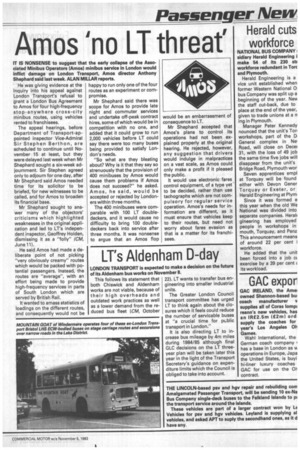Amos 'no LT threat'
Page 23

If you've noticed an error in this article please click here to report it so we can fix it.
IT IS NONSENSE to suggest that the early collapse of the Associated Minibus Operators (Amos) minibus service in London would inflict damage on London Transport, Amos director Anthony Shephard said last week. ALAN MILLAR reports.
He was giving evidence at the inquiry into his appeal against London Transport's refusal to grant a London Bus Agreement to Amos for four high-frequency stop-anywhere cross-city minibus routes, using vehicles rented to franchisees.
The appeal hearings, before Department of Transport-appointed inspector Vice-Admiral Sir Stephen Berthon, are scheduled to continue until November 15 at least, but they were delayed last week when Mr Shephard sought a six-week adjournment. Sir Stephen agreed only to adjourn for one day, after Mr Shepherd said Amos needed time for its solicitor to be briefed, for new witnesses to be called, and for Amos to broaden its financial base.
Mr Shepherd sought to answer many of the objectors' criticisms which highlighted weaknesses in the original application and led to LT's independent inspector, Geoffrey Holden, dismissing it as a "folly" (CM, June 11).
He said Amos had made a deliberate point of not picking ,,very obviously creamy" routes which would be packed with potential passengers. Instead, the routes are "average", with an effort being made to provide high-frequency services in parts of South London which are served by British Rail.
It wanted to amass statistics of loadings on the different routes, and consequently would not be happy to run only one of the four routes as an experiment or compromise.
Mr Shephard said there was scope for Amos to provide late night and commuter services and undertake off-peak contract hires, some of which would be in competition with no one, and added that it could grow to run 2,000 vehicles before LT could say there were too many buses being provided to satisfy London's needs.
"So what are they bleating about? Why is it that they say so strenuously that the provision of 400 minibuses by Amos would cause them problems if Amos does not succeed?" he asked. Amos, he said, would be accepted or rejected by Londoners within three months.
The 400 minibuses were comparable with 100 LT doubledeckers, and it would cause no difficulty to bring 100 doubledeckers back into service after three months. It was nonsense to argue that an Amos flop would be an embarrassment of consequence to LT.
Mr Shephard accepted that Amos's plans to control its operations had not been explained properly at the original hearing. He rejected, however, any suggestion that drivers would indulge in malpractices on a vast scale, as Amos could only make a profit if it pleased the public.
It would use electronic fares control equipment, of a type yet to be decided, rather than use tachographs which are not compulsory for regular service operation. Amos's needs for information are different, as it must ensure that vehicles keep to their routes, but need not worry about fares evasion as that is a matter for its franchisees.




















































































































